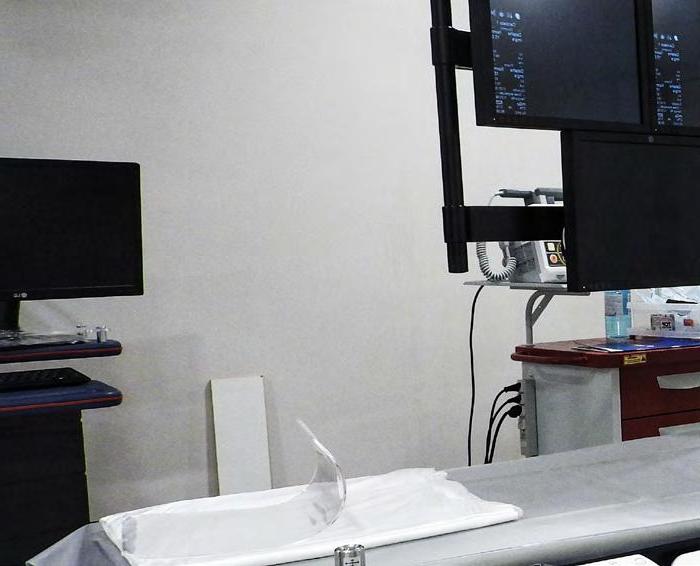
6 minute read
03 Promote innovation and improve knowledge transfer in health
Promote innovation and improve knowledge transfer in health 03
We need a reliable framework for promoting and protecting innovation in Germany and Europe. Before investing in development of new active substances and products, the health industry needs an adequate level of certainty regarding the regulatory environment.
Against a backdrop of increasing international competition, the EU should create a coherent legal framework to remove structural barriers to innovation. This is essential for ensuring that scientific excellence is rapidly translated into economic benefits and industrial competitiveness. The mission letter to the new EU health commissioner highlights the need for the European health industry to remain an innovator and world leader.
Europe therefore needs to develop a coordinated strategy for creating a framework that will enable a supportive business environment. This in turn can lead to development of sustainable innovation and digital change while facilitating the creation of start-ups and the growth of existing businesses. This necessitates close cooperation between EU Member States. Only by working together will Europe remain globally competitive in the future.
Germany also needs to boost its innovation strategies. It has already taken steps to strengthen innovation partnerships with other countries. InnoHealth China, for example, is part of the fourth phase of the German Federal Ministry of Education and Research’s International Research Marketing initiative. For the period 2019–20, it is being led by the Fraunhofer-Gesellschaft.
Recommendations on Innovation Promotion in Europe and Germany:
Support innovation and digital change: We need a coordinated strategy and coherent legislation in Germany and Europe for creating a business environment that will support sustainable innovation and digital change in the health industry.
Assess innovation capacity: We recommend that the European Commission’s revised impact assessment procedure should include regular assessments of the impact on innovation capacity. Boost knowledge transfer: To enable breakthrough innovations in the health industry, we need to strengthen the European Research Area and EU framework programs, and boost knowledge transfer between academic and industrial health research sectors.
Upgrade research funding: The EU’s Horizon Europe (2021–2027) research funding program needs to have at least EUR 120 billion available to make the European ecosystem globally competitive for research and innovation.
Promote partnerships: Health undertakings within Horizon Europe should involve partners from the entire industrial health care sector and the pharmaceutical industry, following the example of the Innovation Medicines Initiative (IMI), a public private partnership (PPP).
Involve industry: To enable risk-based, technology-adjusted measures rather than uniform solutions in the health industry, we recommend strong industry participation in the planned Digital Europe program. Protection of intellectual property is a critical factor in promoting investment in research and development both in Germany and in Europe, especially in the highly innovative field of health technology. The health industry should therefore continue to be closely involved in developing this system.
Learn from one another: We recommend implementing institutions that observe and analyze health-related developments in China, as well as discussions of relevant insights with the European health industry.
04
Advance digital health care in Europe and Germany
Digitization Data exchange Early detection
Digital technologies offer multiple benefits and are transforming the health care sector. New technologies enable better and more efficient medical care, as well as broader access to medical expertise, especially in rural and remote areas. Digital technologies can also help us to better cope with an aging society.
Digital health is an integral part of the European Commission’s Digital Single Market strategy. In Europe, Germany urgently needs to catch up in implementing digital technologies in the health care system. A 2018 comparative study carried out by the Bertelsmann Foundation ranked Germany 16th out of 17 countries in a digital health care index. 70 There are signs that the German health care system is moving in the right
70
Bertelsmann Stiftung, #SmartHealthSystems – Digitalisierungsstrategien im internationalen Vergleich, 10.2018, <https://www.bertelsmann-stiftung.de/ fileadmin/files/Projekte/Der_digitale_Patient/VV_SHS-Gesamtstudie_dt.pdf>. direction, but the road to a digital health care system remains long. The German Federal Ministry of Health (BMG) has put forward a number of laws to advance digitalization of Germany’s health care system, including the Digitales-Versorgungs-Gesetz 71 (Digital Supply Act, DVG) in 2019 and the Patientendaten-Schutz-Gesetz 72 (Patient data protection act) in 2020. These laws aim to provide access to and reimbursement for digital health care solutions, and protect patients’ health care data. The BMG has also initiated a participatory process called Digital Health 2025 to work on the future of digital health and come up with actionable solutions.
71
72
Digitales Versorgungsgesetz, https://www.bundesgesundheitsministerium.de/digital-healthcare-act. html.
Patientendatenschutzgesetz, https://www.bundesgesundheitsministerium.de/patientendaten-schutzgesetz.html.
For Europe and Germany, improving health care requires a system of cross-border exchanges of health data, one that takes into consideration data privacy and data protection requirements. Appropriate, resilient data networks are essential for fully developing the innovative power of digital health care solutions. For this reason, there is an urgent need to put in place a data-sharing framework and a coherent, innovation-oriented legal framework throughout Europe and in Germany.
While first steps have been taken by the European Commission and the German federal government, industry urges all stakeholders to keep up the pace and even step up their efforts in the area of health care digitalization.
Recommendations on Digitization Promotion in Europe and Germany:
Remove regulatory barriers within the European single market: We recommend a strategy for a Digital Single Market for Health (DSM-H) to remove regulatory barriers between national health care markets in EU Member States. The European Commission’s e-Health strategy should include a clear implementation framework with specific targets and deadlines to accelerate the exchange of health data. For the benefit of patients, secure use of data for academic and industrial research should be facilitated both in Germany and at the European level. This requires the establishment of a European health data space.
Promote the exchange of data and interoperability:
In order to promote the exchange of data, e.g., in the context of health care research, the European Commission and political stakeholders in Germany should advocate a legally certain demarcation between anonymization and pseudonymization of personal data. To ensure efficient research and development of innovative therapies, the European Commission should drive the debate about the design and functionalities of an EU health data space. The Commission also should promote development of a legal framework for the use of existing data (e.g. for Big Data analysis) between (and within) EU Member States. Interoperability of digital health care solutions must be strengthened both in Germany and at the European level. This requires EU-wide agreement on mandatory application of international standards, and specifications for their implementation.
Promote early detection and screening: Update the 2003 Council recommendations on early detection and screening and make better use of digital and AI technologies.
Support digital solutions in cancer care: We suggest using EU funds to support deployment of digital solutions in cancer care Europe-wide. Resources from Digital Europe and the structural funds should be earmarked to improve investments in digital cancer care solutions throughout Europe.
Improve digital health skills: Utilize the Digital Innovation Hub infrastructure to address organizations and professionals in health care to improve their digital health skills and training.
Promote compliance: Push compliance with the electronic health record exchange format recommendations (EHRxF) through funding and procurement.
Facilitate cross-border exchange of health data:
The German health care industry is committed to flexible project groups of interested EU Member States for implementation of innovative services within the framework of the eHealth digital service infrastructure (eHDSI). A uniform solution for trust centers throughout Europe will help to facilitate the cross-border exchange of health data over the long term.
Ensure implementation and investment: Secure digitalization of the industrial health care sector in Germany and Europe requires uniform implementation of the EU General Data Protection Regulation (GDPR) and more investment in digital expertise.
Ensure cybersecurity: Cybersecurity is a concern in the field of medical technology. Within the framework of the EU Cybersecurity Act, due attention should be given to this situation by ensuring that the health industry is actively involved in implementation of the EU Medical Devices Regulation.










